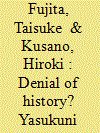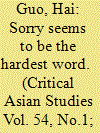| Srl | Item |
| 1 |
ID:
189251


|
|
|
|
|
| Summary/Abstract |
Japan-South Korea relations have consistently been presented by International Relations scholars as a puzzle that confounds mainstream rationalist theories, which struggle to explain the consistent acrimony associated with the so-called ‘history problem’. While many scholars have, therefore, adopted conventional constructivist approaches to incorporate history into their analyses, such literature often neglects the processes of (re)construction of this social reality, thereby implicitly treating these negative sentiments as essentialised elements of Korean and Japanese culture/identity which cause certain foreign policies. Using the recent Japan-South Korea trade dispute as a case study, this article instead draws on critical constructivist/poststructuralist theory and discourse analytical methods to examine how the ‘history problem’ is produced and reproduced. It argues that dominant discourses of remembering in South Korea, which represent Japan as an unrepentant colonial aggressor, and of forgetting in Japan, which represent South Korea as emotional and irrational for dwelling on the past, act to (re)produce identities that clash in their attitudes to difficult history. While such foreign policy practices (re)produce dominant national identities, these identities also shape the bounds of which foreign policies are legitimate or imaginable. This mutually constitutive relationship between identity and foreign policy continually reproduces the ‘history problem’ in Japan-South Korea relations.
|
|
|
|
|
|
|
|
|
|
|
|
|
|
|
|
| 2 |
ID:
174130


|
|
|
|
|
| Summary/Abstract |
Under what conditions would Japanese leaders visit the controversial Yasukuni Shrine and why? Previous studies have focused primarily on the domestic benefits and effects of such visits, claiming that leaders employ visits to follow their own conservative ideology and gain domestic political support. Given the harsh international criticism that tends to ensue, however, political leaders should also consider the cost and international effects of such visits. This study proposes three necessary conditions for such visits: a conservative ruling party, a government enjoying high popularity, and Japan's perception of a Chinese threat. With regard to the latter, a security threat from China has allowed Japan to use these visits as a credible signal of its resolve against China. Comparative analyses of Japanese cabinets after the mid-1980s support this argument.
|
|
|
|
|
|
|
|
|
|
|
|
|
|
|
|
| 3 |
ID:
184144


|
|
|
|
|
| Summary/Abstract |
Conventional arguments understand history-related disputes between Japan and China to be a result of identity politics that revolve around very different interpretations over the historical legacies of WW II. This article challenges these conventional arguments. It shows that history-related disputes between the two sides have less to do with identity politics than with efforts by the Chinese government to deflect domestic discontent over its 1972 decision to waive reparations claims against Japan in return for the Japanese government apologizing for Japan’s actions in WW II. But this tacit arrangement, “the 1972 System,” began to fall apart in the early 1980s. This is because it failed to establish a clear institutional framework that could provide historical justice to Chinese citizens for the actions of the Japanese military in China, embroiled the Chinese government in a chronic legitimacy deficit that can only be mitigated if Japan keeps apologizing, and perpetuated Japan’s victimizer identity, which the Japanese public has found emotionally unacceptable. The result is the transformation of what originally was a domestic controversy in China over historical justice into a diplomatic dispute with Japan over historical understanding.
|
|
|
|
|
|
|
|
|
|
|
|
|
|
|
|